
English | 中文

2021 Top 10 Global CSR News
source:goldencsr date:2022-01-10 17:21:20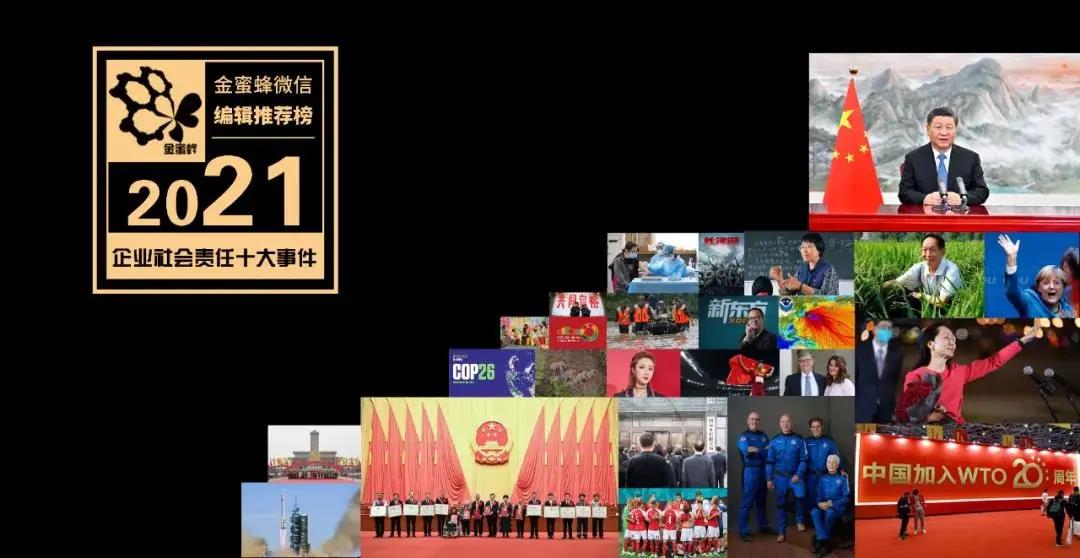
The year 2021 is among a period of major change never seen in a century.
The international situation undergoes profound changes, the COVID-19 pandemic continues to spread, and relations between major powers are deeply adjusted. The international community is challenged by transnational and global issues. Among them, frequent extreme weather and natural disasters, intertwined with the pandemic, are aggravating the crises in food, human health and survival.
Transformations are catalyzed by these changes.
A broad consensus on achieving “green recovery”, strengthening global governance and creating a sustainable future has reached. In 2021, it was delighted to see that topics such as “climate change”, “biodiversity” and “carbon neutrality” have become global hotspots. Governments, industries, private sectors and social organizations etc. have taken active actions, and gathered strong synergies to accelerate the 2030 Agenda for Sustainable Development.
Annual review opens a new journey towards sustainability.
Since 2006, we have been selecting and publishing the annual list of top 10 CSR events for 16 years. As the first step in 2022, China Sustainability Tribune (formerly known as China WTO Tribune) selected the 2021 Top 10 CSR Events in the world (in chronological order) to review and salute all efforts in social responsibility development and welcome a better sustainable world.
01 UNCTAD updates bio-trade principles and standards
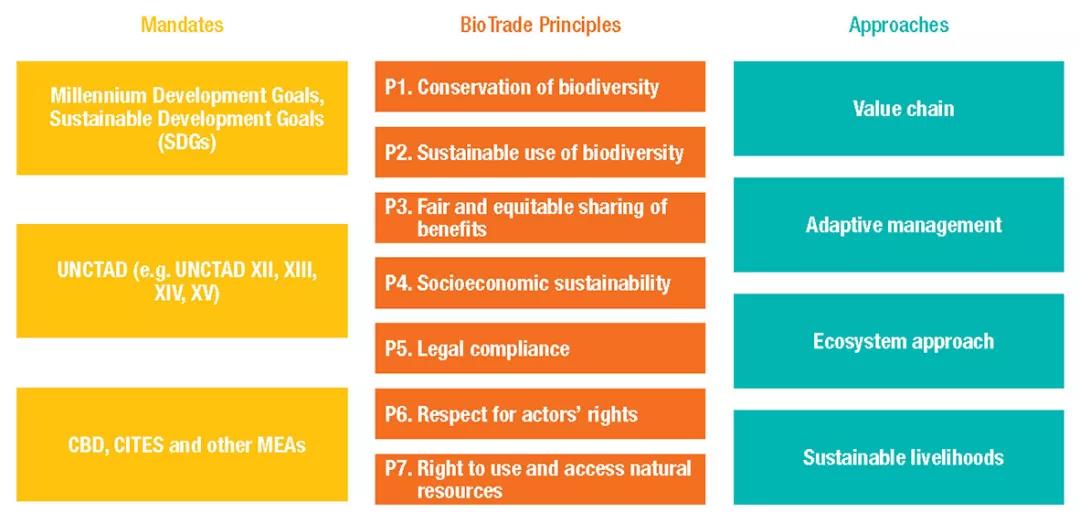
On January 14, 2021, the United Nations Conference on Trade and Development (UCTAD) issued the updated BioTrade Principles and Criteria (BT P&C) . BT P&C is designed to guide governments and companies in developing trades that is beneficial to biodiversity to meet new challenges and priorities now and in the future. Based on the Nagoya Protocol on Access to Genetic Resources and the Fair and Equitable Sharing of Benefits Arising from Their Utilization of Convention on Biological Diversity, contents such as workers' rights, health and safety, and access to benefit sharing are updated in BT P&C.
Reason for listing:
2021 is a big year for biodiversity conservation. The Kunming Declaration from the High-Level Segment of the UN Biodiversity Conference 2020 (Part 1) calls on all parties to take action to build a shared future for all life on earth. The updated BT P&C lays out more comprehensive, detailed and strict guidelines on how to trade the precious natural resources on earth in a sustainable manner in the fields of the environment, society and economy. As an international guidelines for building a trade environment conducive to biodiversity, it will force global companies and partners to review their own business activities.
02 WBCSD launches Vision 2050: Time to Transform
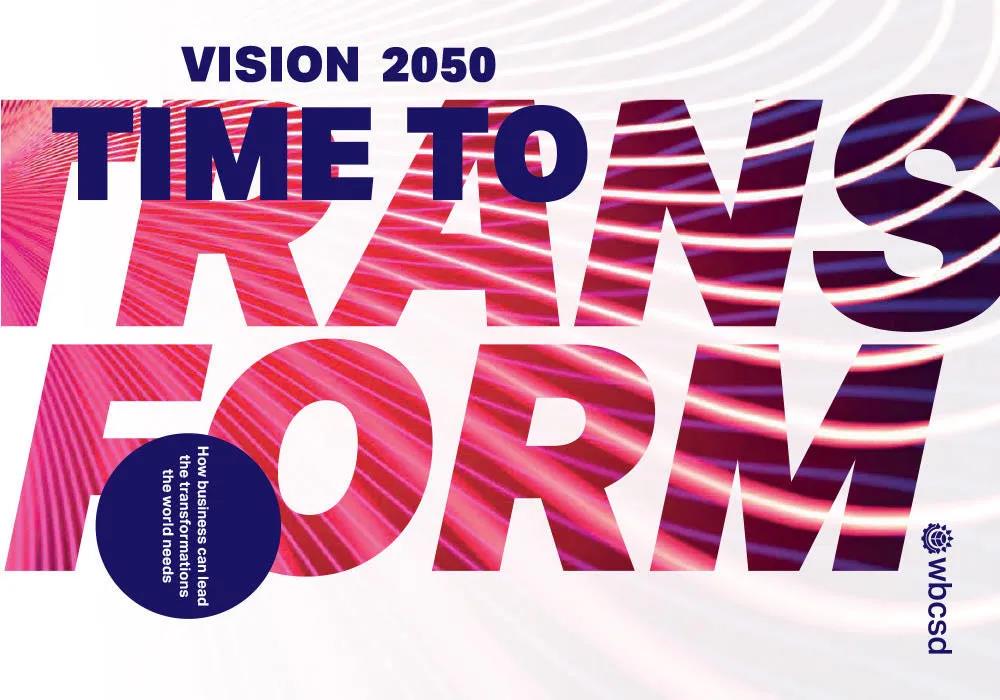
On March 25, 2021, the World Business Council for Sustainable Development (WBCSD) released a new report Vision 2050: Time to Transform. The report provides the business community with comprehensive and reliable guidance on how it can make the transformations. Vision 2050 offers a framework for action in the decade ahead. The framework sets out nine transformation pathways towards transformation, and their action areas include: energy, transportation and mobility, residential space, products and materials, financial products and services, interconnection, health, water and sanitation facilities, and food. Business leaders must radically transform their three strategic mindsets: a reinvented capitalism that rewards true value creation, a long-term resilience, and a harmless regeneration.
Reason for listing:
Under the global challenges of climate crisis, natural loss and inequality, "transformation" is an inevitable way for businesses to achieve sustainability. Through a comprehensive human-centered approach, Vision 2050 has formulated nine transformation pathways in key areas, detailed the key transformations required and the actions that can be taken at present, and provided companies with an action plan to meet challenges. The UN 2030 Agenda for Sustainable Development is not the end of actions. Based on a longer-term perspective, WBCSD put forward Vision 2050, giving directions for the transformation of managers' thinking, especially strengthening companies' resilience to risks and future challenges during the economic recovery after the pandemic.
03 UN launches the SDG Investor Platform

On April 14, 2021, the United Nations Development Programme (UNDP) and the United Nations Secretary-General’s Global Investors for Sustainable Development Alliance (GISD) launched the SDG Investor Platform, an innovative tool to facilitate private sector investments that contribute to furthering the SDGs. The Platform is built on UNDP’s SDG Investor Maps and leverages on UNDP’s presence in more than 170 countries and territories.
Reason for listing:
To embrace a more sustainable, fair and prosperous future, investors must adjust their strategies to achieve not only economic benefits, but also social and environmental benefits. How to obtain effective information is the key to building a bridge between investors and the private sector. The platform provides the key data, insights and tools for investors to drive more capital flows to the projects related to achieving SDGs. This platform will help countries release key funds, facilitate recovery from the pandemic and better development, and ultimately promote the well-being of mankind and the planet.
04 EU issues Corporate Sustainability Reporting Directive
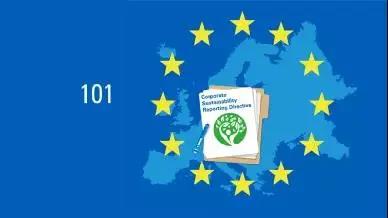
On April 21, 2021, the European Commission adopted a proposal for a Corporate Sustainability Reporting Directive (CSRD), which would amend the existing reporting requirements of the NFRD released in October, 2014. The proposal:
· extends the scope to all large companies and all companies listed on regulated markets (except listed micro-enterprises)
· requires the audit (assurance) of reported information
· introduces more detailed reporting requirements, and a requirement to report according to mandatory EU sustainability reporting standards
· requires companies to digitally ‘tag’ the reported information, so it is machine readable and feeds into the European single access point envisaged in the capital markets union action plan.
According to estimates, about 50,000 EU companies will comply with the new regulation.
Reason for listing:
The issuance of the CSRD indicates that EU non-financial information reporting will undergo a qualitative change. The report preparation will be expanded from social responsibility to sustainable development, the standard setting will be shifted from passive adoption to independent formulation, and standards of report preparation will be changed from adopting multiple ones to unified ones, the scope of preparation will be greatly expanded from partial pilots. This CSRD will play a stronger role as a tool to effectively narrow the gap between leaders and laggards in various fields, which is important for accelerating the transformation of global companies for sustainable development.
05 UN issues Corporate Net Zero Pathway
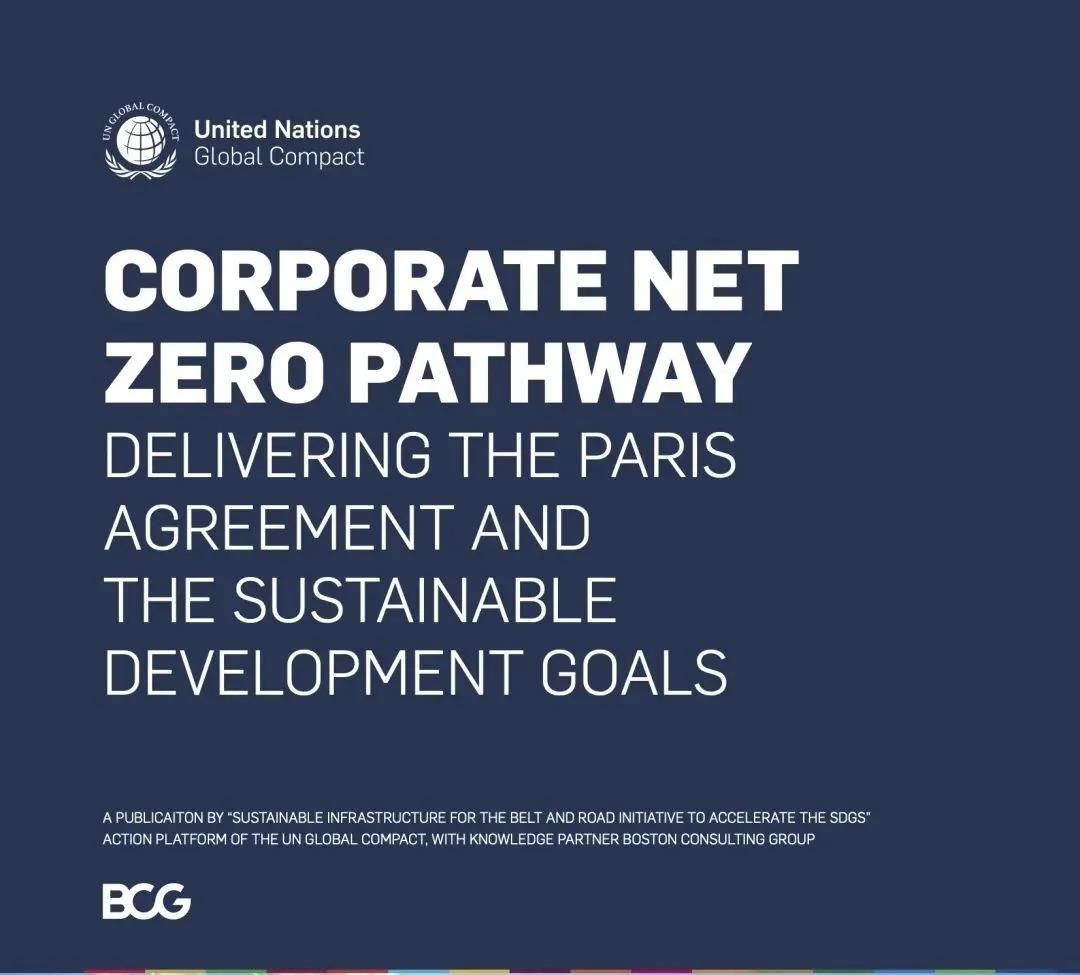
At the UN Global Compact Leaders Summit on June 15-16, 2021, Corporate Net Zero Pathway has been published to plot a roadmap for corporates to reach net zero, facilitating the private sector to play its role in the pathway. The report elaborates how corporates design their net zero roadmap and suggests specific decarbonization initiatives for infrastructure industries from the consumption side of energy firms. It builds a clear picture of key actions that can be widely adopted in various industries and companies, and looks forward future climate technology investment. The report will encourage companies to actively fulfill their social responsibilities, strengthen cooperation among countries, and accelerate the realization of the UN SDGs.
Reason for listing:
Carbon peak and carbon neutrality have become an irreversible global trend. In the face of the new normal of net zero transition worldwide, companies should not only base themselves on national conditions and regulations from home and abroad, but also follow international standards and best practices in the global market. The Pathway will guide different sectors to formulate clear and scientific corporate carbon neutral roadmaps, make science-based, measurable and comparable contributions to the implementation of the Paris Agreement, and accelerate the achievement of the UN SDGs.
06 Amazon hits €746 million fine for violating GDPR
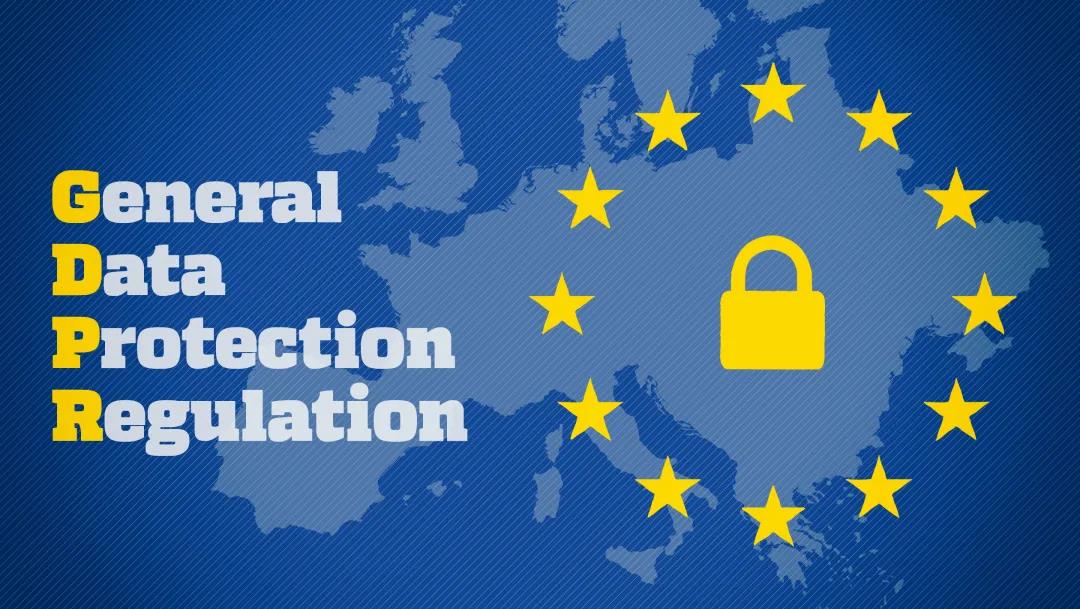
On July 16, 2021, the Luxembourg National Commission for Data Protection (the “CNPD”) issued a decision against Amazon Europe Core S.à r.l., claiming that Amazon’s processing of personal data did not comply with the EU General Data Protection Regulation (GDPR). The decision imposes a record-breaking fine of €746 million and corresponding practice revisions.
Reason for listing:
In the big data era, data is undoubtedly the most important asset of companies and individuals. However, incidents of data breaches or third-party theft of customer data have occurred frequently in recent years. On the premise that more emphasis should be placed on data privacy as a basic right of citizens, the high penalty serves as a warning to companies that they should responsibly deploy data privacy policies, actively ensure data security, and consider data privacy issues at the beginning.
07 President Xi announces no new coal-fired projects abroad
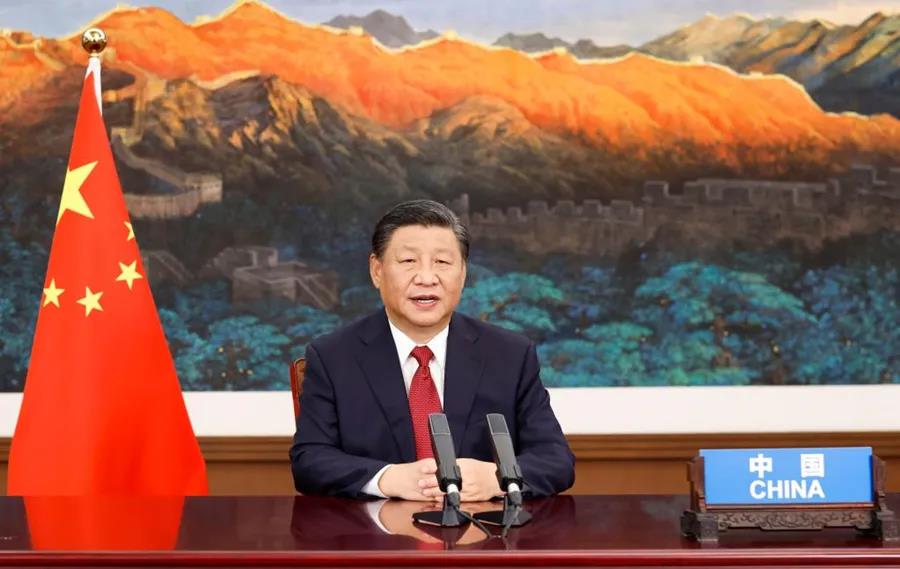
President Xi addressed the general debate of the 76th session of the United Nations General Assembly via video in Beijing on September 21, 2021. China will not build new coal-fired power projects abroad, he said, pledging that the country will step up support for other developing countries in developing green and low-carbon energy. It was confirmed that more than 190 parties, including China, Poland, and institutional financial organizations, have agreed to a range of different measures that will signal the end of coal as a global power source. Additionally, the coalition has agreed to phase-out coal power from major economies by 2030 and 2040 for the rest of the world.
Reason for listing:
China's commitment to no new coal-fired power projects reflects China's commitment to promoting global energy transformation, low-carbon development and carbon neutrality, leading the world in the development and governance of clean energy, and playing a major role in global climate governance. Chinese companies will contribute to the green Belt and Road development with green energy, playing a greater role in supporting the green and low-carbon transformation of developing countries.
08 UNESCO members adopt Ethics of AI agreement

On November 24, 2021, 193 UNESCO’s member states officially adopted the first ever global agreement on the Ethics of Artificial Intelligence. The ethical framework contains action-oriented chapters involving data management, education, culture, labor, healthcare and economics, and will address issues related to transparency, accountability, and privacy, to ensure that digital transformation promotes human rights and advances the SDGs.
Reason for listing:
As a key technological innovation leading the fourth scientific and technological revolution, AI has brought significant and far-reaching impacts on global social and economic development; however, there is still a lack of global governance standards. The Ethics of Artificial Intelligence is not only the world's first rule and a common platform for AI, but also the broadest consensus reached at government level around the world, which will urge global technology companies to strengthen transparency, accountability and privacy-related issues to promote the healthy development of the AI industry.
09 UN Global Compact announces Africa Strategy 2021-2023
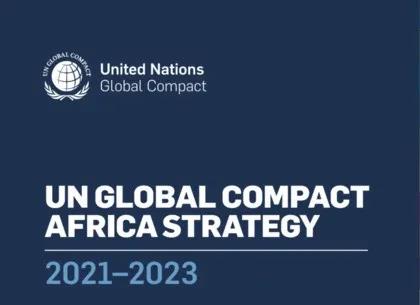
The UN Global Compact Africa Strategy 2021-2023 was announced on December 2, 2021, aiming to accelerate and scale the impact of the private sector engaging key business associations across the Continent, multinational and pan-African corporations, and major financial institutions to drive progress towards the UN Sustainable Development Goals across the African continent by the 2030 Agenda for Sustainable Development and the African Union’s Agenda 2063.
Reason for listing:
The key to achieving the UN SDGs lies in the development process in the less developed regions. Africa's economies have expanded in recent years, with flourishing private sector and markets, and improved governance and institutions. However, challenges related to infrastructure, financing, informality and global competition remain and are exacerbated by the impact of the COVID-19 pandemic. The Strategy unites business associations, industry supply chains, financial institutions and capital providers to promote the sustainable development in the private sector.
10 EU plan to boost gig economy workers

A new European Union plan to improve conditions for the growing number of gig economy workers includes provisions that would classify millions more of them as employees entitled to benefits. The draft rules outlined on December 9, 2021, aim to clarify the labor status of people employed by app-based companies like ride-hailing service Uber and food delivery business and would add oversight for the algorithms they use to manage workers.
Reason for listing:
The emergence of the platform economy and gig economy has led to structural changes in the labor market. The platform-based companies generally regard the drivers or workers on their platforms as "partners", which means that they belong to the self-employed, rather than regular employees. The move is the EU's latest attempt to regulate technology companies and level the playing field. With the new rules, workers on the gig economy platform will be protected, which is an important step towards a more inclusive digital economy.
As an annual record of the CSR policies and practices, China Sustainability Tribune has been selecting and publishing the annual list of top ten CSR events for 16 years since 2006.
In order to ensure a more comprehensive, accurate, open and transparent selection, we seek opinions from external experts from governments, companies, universities and research institutions in the field of CSR to ensure the professionalism, authority and transparency.
Experts participating in the selection of the “2021 Top 10 International CSR Events” and putting forward opinions and suggestions include:
• Guo Xiuming, former Associate Counsel, Department of Policies, Laws and Regulations, Ministry of Industry and Information Technology
• Chen Yuanqiao, Researcher of China National Institute of Standardization (CNIS)
• Zhai Qi, Executive Secretary-General, China Business Council for Sustainable Development (CBCSD)
• Cheng Duosheng, former Director of Innovation Working Department of Chinese Enterprises Federation
• Han Bin, Executive Director of UN Global Compact Network China
• Liang Xiaohui, Chief Researcher of Social Responsibility Office, China National Textile and Apparel Council
• Zhang Shaoping, Vice Chairman and Executive Director, China Committee of Corporate Citizenship, China Association of Social Workers
• Qian Xiaojun, Vice Dean of Schwarzman College, Tsinghua University; Director of Green Economy and Sustainable Development Research Center, Tsinghua University
• Cui Shengxiang, Professor, China University of Labor Relations
• Xue Dayuan, Professor of Minzu University of China
• Li Li, Associate Research Fellow of Institute of International Economy, University of International Business and Economics (UIBE)
• Guo Yi, Professor of School of Economics, Beijing Technology and Business University (BTBU), and Director of Business Environment Research Center, BTBU
• Zhou Weizhong, Professor of Business School, and Director at China Enterprise Research Center, Central University of Finance and Economics
• Yu Zhihong, President and Editor-in-Chief of China Sustainability Tribune
• Yin Gefei, Chief Expert of GoldenBee Thinktank; Deputy Secretary General of ISO 26000 Stakeholder Global Network (SGN)
• Guan Zhusun, Executive Dean of Huazhong University of Science and Technology-GoldenBee CSR Research Institute
Thanks to experts who participated in the selection of “2021 Top 10 Global CSR News”.